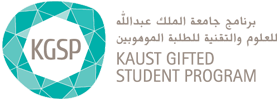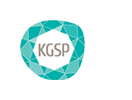Alumni Spotlight: Dona Alburi
Dona Alburi’s journey is anything but ordinary. From navigating the academic rigor of a biology degree from Boston University, to diving deep into the world of strategic consulting, Dona has consistently charted her own course. What began as a passion for science and research evolved into a dynamic career that now places her at the heart of Saudi Arabia’s rapidly growing sports industry. With each step – from research labs, to consulting firms, and now to the Ministry of Sport, Dona has redefined what success looks like, proving that the most meaningful journeys are the ones where you draw your own map.
Could you tell us a little bit about where you come from?
I grew up in Jeddah. I was born and raised there and lived there most of my life until college. My mom grew up in Mecca and my dad grew up in Taif. They moved to Jeddah after getting married. Both of my parents come from Yemeni families that made Saudi Arabia their home long before I was born.
My mom is a recently retired university math professor. She originally wanted to study medicine, but due to limitations tied to her residency status at the time, that path wasn’t available to her. Instead, she pursued mathematics, earning her undergraduate degree from Umm Al-Qura University, moving to Riyadh for her master’s at King Saud University, and eventually completing her Ph.D. at King Abdulaziz University.
Growing up, education was prioritized in our household. My mother, the first and still the only person in her family to pursue higher education, made it her mission to give her four children access to every opportunity. Everything she earned was invested into our learning: from enrolling us in good schools to signing us up for swimming lessons, she ensured that we were always growing. In that way, my mom is my inspiration, which is why I cared about school, getting into a good university, and finishing my master's. It was because my mom had paved the way.
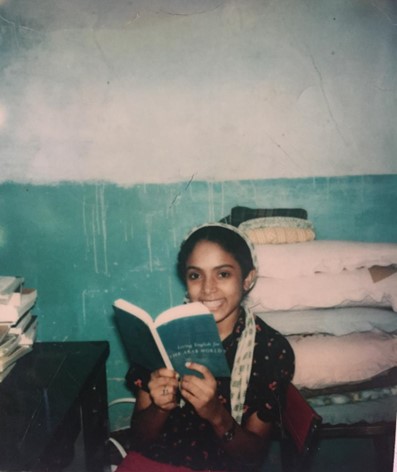
Dona’s mother (pictured above as a child) was an inspiration for her to pursue higher education and seek out international experiences.
What led you to the KGSP?
I had been exposed to the U.S. education system when we lived in Athens, Ohio for two years while my mom was doing research at Ohio University. I was in 8th and 9th grade. For me and my siblings, this was a big transition. The subjects I was studying, like history and literature, were taught differently. They were going into much deeper analysis than I was used to. That introduced me to the idea that there is a different way of learning and thinking, and so many aspects of my perspective changed. I started feeling like I really wanted to study abroad, and that I did not want to do it just for the sake of studying abroad. My focus was on getting into a good school.
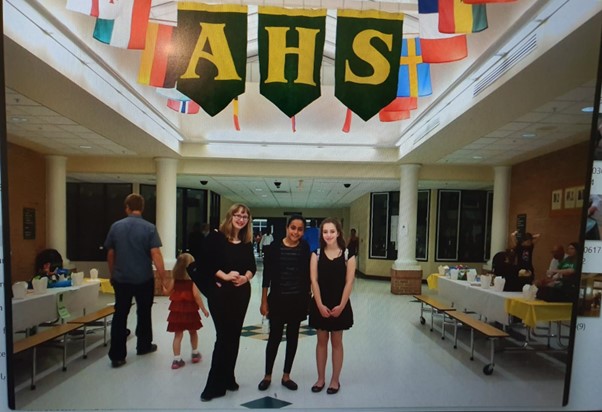
Dona with her classmates while studying in Athens, Ohio.
I was researching scholarship programs online and I discovered an old page about the KGSP that included some of its students. So, I reached out to one of them named Mohammed Alshahrani, who was studying at Yale and was in the early cohorts of KGSP. He told me about how great KGSP was and all the benefits for students. Just talking to him was impressive to me. I wanted to be just like that and to have those resources. Sadly, Mohammed passed away last year, but I remain incredibly grateful that I had the chance to speak with him. His encouragement left a lasting impression on me.
How did the KGSP set you up for success, both academically and in your career?
Academically, KGSP helped me in so many ways. I was not only surrounded by other like-minded people, but also, I was given so many tools and opportunities. We all know how intimidating college is, especially freshman year, and especially when you are moving from a completely different country. But I think there was that element of confidence because I had those tools and a network with me.
Throughout college and into my career, I was continuously surrounded by this network that continues to grow. I can reach out to anyone and connect with so many people who may potentially share job opportunities. We have WhatsApp groups where people share open positions and any sector or industry questions. If I want to ask about a company, there is probably someone who knows something about it. There are so many doors. You just have to knock.
While in the KGSP and at KAUST, I was introduced to so many careers I did not know existed. I studied biology for both my bachelor's and master's. I thought I was going to continue with a PhD in biology. However, I realized that I did not want to stay in academia, but I did not know what else to do. Because I knew other people from KGSP who came before me and pursued consulting, I learned more about the field.
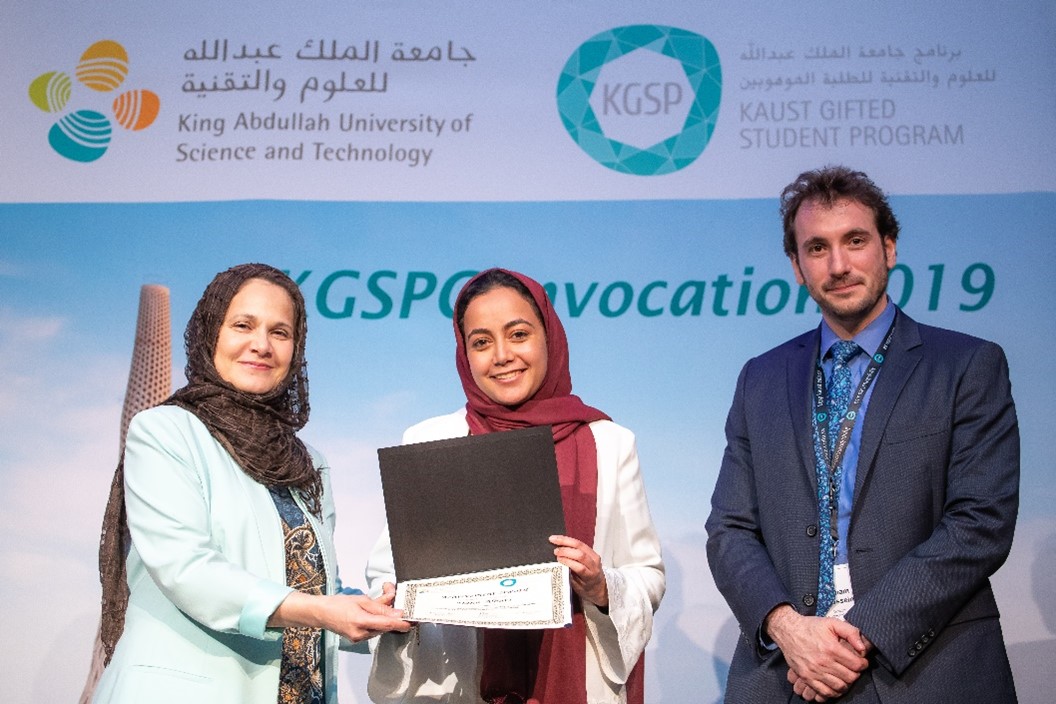
Dona at KGSP’s Commencement Ceremony in 2019, standing alongside Dr. Najah Ashry and Suham Alhusseini.
What skills did you develop as a part of the KGSP and KAUST that helped you pursue your career?
One skill I gained is resilience. KGSP is a competitive environment. You push yourself and you interact with students who are incredibly intelligent. You cannot help but want to do well and be inspired by the people around me. At KAUST, I was doing my master's research, and I was writing my thesis. Those were especially challenging because it was during COVID.
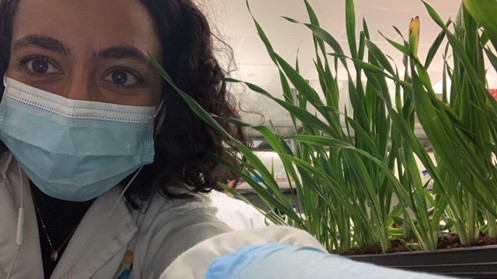
Dona performing her Master’s plant science research.
I sometimes think about how I studied biology for both my bachelor's and master's, and now I am not utilizing most of my biology knowledge. However, I gained a lot of skills and experiences from being in STEM. It made me realize that I really like research in general, just seeking out new information and solving problems. My biology degree was very knowledge-based, but I feel like I gained a lot of skills in college, whether it is research, analysis, and so on, that still continuously apply.
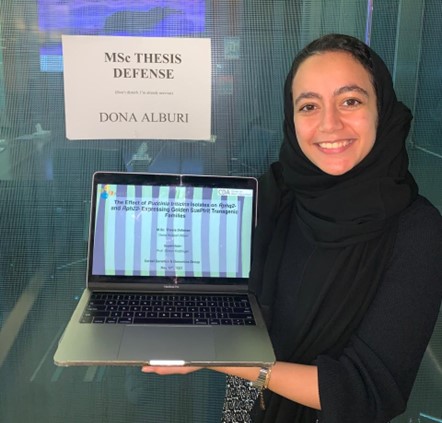
After your transition from biology and academia to the consulting field, you made another transition to working for the government in the Ministry of Sport. What led you to make that transition?
In consulting, you get to explore different kinds of projects. You move from one thing to another. We grow in a different way because we are not in a specific sector, and your clients are mainly government entities. But when you are working on the government side, the question is: how do you make sure that all the work being delivered is something we want and can later take on and implement?
Consultants bring analysis and recommendations, but the direction has to come from you. You need to critically assess the work and say, 'This doesn’t match our ambitions,' or 'Here’s where we need to adjust.' That kind of judgment, thinking long-term and understanding every aspect of the project, is a valuable skill, and one I wanted to build.
But also, I wanted to transition because I wanted to be in an entity that I see growing. The sports sector in Saudi is starting to peak and is doing really well, and I want to be a part of that. The things we work on in Ministry of Sport, because I am in the strategy department, align with Vision 2030 and how we envision the sports sector developing by then and beyond.
When I was going to school in Athens, Ohio, I participated in track and cross-country running. I would go to meets with the team and I really tried to give myself that experience of competing. In 2012, during the London Olympics, I remember watching one of the first female athletes representing Saudi Arabia, Sarah Attar, run the 800 meters. To me, it was a big deal that a woman was running in the Olympics. I didn’t continue running, but when I started working at the Ministry of Sport it reminded me of what I was interested in as a kid. I have a connection to sports and I can continue to build on it.
What is something you are looking forward to?
Something I really look forward to is maintaining consistency in my life. Now that I have a more stable routine and a much better work-life balance, I finally have the space to focus on myself. While I was working in consulting, it was hard to establish any kind of daily rhythm. Now, I can focus on eating well, going to the gym, and creating healthy habits. It feels really good, and I’m excited to continue building on that sense of balance.
What is one piece of advice that you would give to a current KGSP student, or maybe even a younger version of yourself?
Trust the process. In school, I was really hard on myself. When I was in high school, I was stressed about college. When I was in college, I was stressed about what comes after. But things just end up working out in some way or another. And if they don’t, there is always an alternative. Nothing is ever really final. If you gain the skill of trusting the process, then you can actually enjoy the current stage you are in, whether it is high school, college, or your career.
The image you once had of your future and what success would look like might not match where you end up. And that is okay. It is not a failure if your path looks different. That image changes slowly over time, and it is completely normal. When I was younger, I believed success meant getting a PhD. Now I understand that success can take many forms, and I get to define it for myself. If I do not define it, someone else will always try to define it for me.
